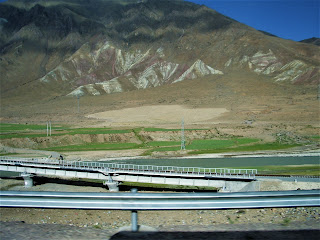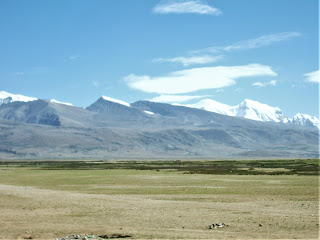TIBET JUNE 2007
DAY 6
Jun 9
Namtso Lake
We left
Lhasa Manasarova Hotel after breakfast. The bus travelled east in the valley along
the Lhasa River and then turned north towards Namtso Lake along Pengyunian Ou (river).
The whole journey was over 6 hours.
The Tibetan Plateau is very sparsely populated with occasional houses and herds. Mountains on both sides of the roads are beautiful and the grassland greenish under the summer sun.
About 2 hours into the drive, we stopped for a short break near a village. There was a thermal spa nearby.
After lunch, we continued the drive to Namtso Lake. The size of the lake is twice the area of Singapore at an altitude of 4718m (15.479 feet) making it the highest saline lake in the world.
Namtso,
Tibetan for Heavenly Lake is often described as being next to heaven with its
stunning beauty, pure blue water and spiritual associations.
We had a horse ride near the shore of Lake Nam
Namtso is
one Tibet's most sacred lakes, and is known by locals as a Holy Lake. With over
9 holy lakes in Tibet, Namtso is considered the most famous. This stunning,
mountainous lake is located in Nagqu, a town in northern Tibet approximately
200 miles by road north-east of the capital Lhasa. The lake itself is situated
at a height of over 15,000 feet, covering an area of 1180 square miles; this is
one of the highest and largest salt lakes in the world. The Holy Lake is home
to five uninhabited islands once used for pilgrimages although now banned by
the government. Locals regarded this trek as a spiritual retreat, with pilgrims
walking over the lake's frozen surface at the end of winter, carrying their
food with them. They spent the summer there, unable to return to shore again
until the water froze the following winter. Visitors here can enjoy the
incredible surroundings with wild yaks, an endless variety of birds, hares and
other local wildlife that are part of the ecosystem of this picturesque
destination. Local people in their colorful traditional dress will happily pose
for photos, and allow tourists to ride their yak for a small fee or enjoy a
walk along the shore, climb the rocky landscape or visit the old monastery at
the top of the hill cleverly built into the rocks.







































































No comments:
Post a Comment